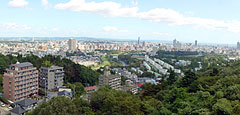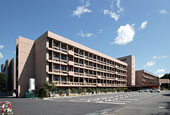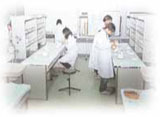History
 |
 |
 |
Tohoku University was established in 1907 as the third Imperial University
following the University of Tokyo and Kyoto University. It was planned on the
concept of a center of academic creation unlike the preceding universities, and
has firmly maintained an academic tradition of emphasis on research until now.
The philosophy of Open Doors to accept and work hard with people who wish to
study, and the tradition of creative research to explore and elucidate
unexplored academic areas rather than maturing/matured areas, have been Tohoku
University's characteristics. It has now 10 undergraduate schools, 18 graduate
schools, six research institutes, hospital, and libraries, as well as many
shared facilities and education/research facilities, with a staff of nearly
6,500, including about 3,200 teachers, and more than 10,000 undergraduate
students, about 7,000 graduate students, and about 1,600 international students.
Among the organizations of Tohoku University as described above is the Graduate School of Pharmaceutical Sciences. The Graduate School has a long history of pharmaceutical education. It was started as the Department of Pharmaceutical Sciences of the Faculty of Medicine of the Second High School under the old education system (the predecessor of the current School of Medicine) in 1890, and lasted until 1918 as the School of Pharmaceutical Sciences of the College of Medicine of Tohoku University. Then, after a hiatus of 40 years, it was re-established as the Pharmaceutical Institute of Tohoku University in 1957, and re-organized as the Faculty of Pharmaceutical Sciences
in 1992. In 1999 the Graduate School of Pharmaceutical Sciences as a graduate school was established. The Graduate School consists of three majors:
Molecular Pharmaceutical Science, Life and Pharmaceutical Science, and Pharmacy, providing undergraduate education and graduate school education continuously. It has a 2-year Master's program and a 3-year Ph.D. program. In1997 it opened the door of the Ph.D. program to working people with an aim to developing human resources in diverse areas.
The building of the Graduate School of Pharmaceutical Sciences was constructed in the Aobayama area in 1969. The building is on a hill with refreshing air, endowed with green leaves and frequent blue skies, looking down the Hirose River, far over the Pacific Ocean to the east, the Zao Mountain Range to the west and the Ou Mountain Range including Mt. Izumigatake to the north. Its inside was remodeled in 1996-7, and the Applied Pharmacological Research building was completed in 2003. In that way facilities were provided for the areas of research added when the Graduate School of Pharmaceutical Sciences was reorganized as an independent major, and further emphasis was put on the graduate schools in 1999. There are also a Botanical Garden (an area of about 53,000 m2)
for pharmacological herbs attached to the building, with comfortable landscapes.
While the Graduate School of Pharmaceutical Sciences has gone through historical
changes, the staff including teachers and students have overcome difficulties
and further developed the School at every turn of time with a spirit of
cooperation and a frontier spirit. Such spirits, together with the strict spirit
of exploration of scientific truth in research, have been inherited by this
School as characteristic academic traditions.
Faculty of Pharmaceutical Sciences
Educational goal for Education of Faculty of Pharmaceutical Sciences
 The Faculty of Pharmaceutical Sciences has both the Department of Pharmaceutical Sciences (4-year program) and the Department of Pharmacy (6-year program). Together with the education/research at the Graduate School of Pharmaceutical Sciences, which is based on undergraduate education, the Faculty develops human resources that are able to engage in the research and development on the science of drug discovery aiming at elucidating life phenomena and creating new pharmaceutical products, and human resources that are able to contribute to the development of medicine as pharmaceutical experts.
The Faculty of Pharmaceutical Sciences has both the Department of Pharmaceutical Sciences (4-year program) and the Department of Pharmacy (6-year program). Together with the education/research at the Graduate School of Pharmaceutical Sciences, which is based on undergraduate education, the Faculty develops human resources that are able to engage in the research and development on the science of drug discovery aiming at elucidating life phenomena and creating new pharmaceutical products, and human resources that are able to contribute to the development of medicine as pharmaceutical experts.
Department of Pharmaceutical Sciences
In the 4-year program, the ethics, culture and intellectual ability with which a person who works in medical service should be endowed are learned along with methods for experiments and analyses through practice and graduation research so that they have the basics as researchers and engineers in the field of drug discovery. The knowledge and ability that students acquire through the program will be polished if they proceed to the Graduate School providing a 2-year Master's program and a 3-year Ph.D. program. Then, they can be a prime mover in society as researchers and engineers in the field of drug discovery.
Department of Pharmacy
In the 6-year program, students acquire the basics of pharmacy and knowledge in clinical pharmacy, and learn the ethics, culture and intellectual ability with which a person who works in medical service should be endowed. They develop their researcher's mind, and acquire the practical skills and knowledge required for a pharmacist through practices in laboratories, hospitals and dispensing pharmacies. Then, they take the national examination for the license of pharmacist. The knowledge and ability that students have acquired through the program will not only help them be qualified as a pharmacist, but also lead them to taking an active role in the medical field as a pharmacist with sophisticated skills/knowledge with full of a good researcher's mind. They will also have the basics on which they can proceed to the Graduate School providing a 4-year Ph.D. program. Then, they can be researchers in the field of clinical pharmaceutical science.
Graduate School of Pharmaceutical Sciences
Educational Idea

The Educational idea of the Graduate School of Pharmaceutical Sciences is to develop human resources that can contribute to the welfare and development of human beings through drugs. To achieve this, the School provides graduate school education with the following purpose.
Goal for Graduate School Education
The goal for education of the Graduate School of Pharmaceutical Sciences is to develop researchers/engineers in pharmacy who have acquired knowledge and skills in a wide pharmaceutical range and have the ability to produce original ideas and international competitiveness. Particularly, the first course in the Ph.D. program or Master's program (i.e., master's course) endows students with sophisticated knowledge about creation through proper use of drugs, and the ability to apply the knowledge based on the basic knowledge and skills that they acquired through undergraduate education. The second course of the Ph.D. program (i.e., doctorial course) develops their ability to do advanced research in the science of drug discovery and clinical pharmacy by themselves to become excellent researchers.
History
The Graduate School of Pharmaceutical Sciences (Pharmacy Major) was established in the Faculty of Pharmaceutical Sciences of Tohoku University in 1961. A Pharmaceutical Chemistry major was added in 1974, and a Molecular Life Pharmaceutics major in 1993, in order to have an educational/research system that was internationally competitive in the academic area. In 1999, Tohoku University substantially reorganized its graduate schools so that it would put great emphasis on education and research in those schools rather than the undergraduate faculties. The current Graduate School of Pharmaceutical Sciences consists of three majors: Molecular Pharmaceutical Science, Life and Pharmaceutical Science, and Pharmacy, engaging in education and research in the cutting-edge field of pharmaceutical research.
Characteristics
On the basis of the University's traditional academic principle of the spirit of Research First, that is being wide open to society and developing unexplored academic areas, this Graduate School puts the greatest emphasis on developing human resources that are able to do future pharmaceutical research, responding to rapid developments of life and medical sciences, and everyday increasing pharmaceutical needs in society. It is also characteristic of this School in that it is located in an environment full of greenery with a panoramic view of Sendai, also known as the City of Trees. It has well-developed research facilities including a botanical garden for pharmaceutical herbs with the largest area in Japan to be proud of. The buildings for education and research have been remodeled. Accordingly, this Graduate School is in a good environment where the researchers/students can devote themselves to research work comfortably without disturbing stresses.


